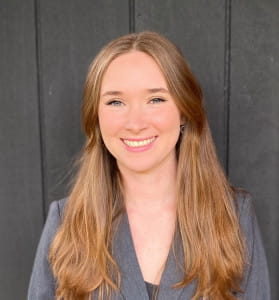‘Go Outside Your Comfort Zone’: How to Maximize the Pandemic-Driven Online College Experience
5/18/21
Kate Martin, 20, is a sophomore at the University of Arizona and currently resides in Port Angeles, Wash. Martin shares the key ingredients to successful online learning and encourages her peers to use the experience as an opportunity for growth.
In March 2020, Kate Martin was enjoying a spring break visit with her family in Houston, Tx. Then a freshman at the University of Arizona (UA) in Tucson, Ariz., Martin had hit the ground running in her first semester, dedicated to achieving excellence in her triple major: Finance, Law, and History. However, when the COVID-19 pandemic shuttered college campuses around the world, millions of students were left in the lurch, struggling to transition to virtual lectures and online coursework. For Martin, however, there was a home-field advantage—she had done this before.
One year after the COVID-19 crisis swept the globe, the impact on higher education is still being measured. While many students are still taking online classes and waiting to return to campus, a recent report from the National Student Clearinghouse (NSC) Research Center found that, overall, college enrollment had declined by 4.5 percent for the Spring 2021 semester, accounting for a student population of more than 600,000.
According to Martin, the reaction to online learning from her peers has been mixed: some prefer live virtual lectures that simulate an in-person experience, and others have found their niche with asynchronous instruction. “Some of my friends wish we’d never have to go back to campus,” she remarked.
While Martin would like to return to the UA campus, she didn’t skip a beat when her courses and campus activities moved to an online environment last year. In 2019, Martin graduated from Laurel Springs School, a school that is often regarded as the first provider of online K-12 education. Martin says there are several key skills that she learned as an online high school student that prepared her for this experience in college.
“Communication is one of the most important things I learned by attending an online high school,” Martin explained. “You have to be proactive in building relationships with your teachers and counselors, and have the discipline and responsibility to reach out when you need help or when you are looking for feedback, since these people are not physically in front of you every day.”
“Being able to engage, develop relationships, and communicate effectively with people through email, phone calls, and video conferencing are all communication skills that translate to college and to the professional world,” Martin continued.
Similarly, for all students and working professionals, finding a work-life balance can be a daunting challenge. Martin, who balanced her academic responsibilities in high school with an athletic commitment to competitive tennis, now manages her time between coursework, campus leadership, and internship opportunities. She holds four executive leadership positions at the UA, working with the school’s Investments Club, Financial Management Association, United Nations-driven AIESEC committee, and Arizona Divest, a campus organization committed to divesting from fossil fuels. Martin is also completing an online internship with CitiGroup in New York, N.Y., and says that prioritizing a work-life balance has been key to her productivity.
“Feeling like you need to be working at all times can actually hurt your overall productivity and wellbeing,” Martin said. “If you’re sitting there trying to work or study, and your brain is completely fried, you are just wasting time. It’s important to learn when it’s time to take a break, and you have to find the things that you enjoy doing outside of school or work. Everyone needs more time in their lives to do what they love and what makes them happy.”
For Martin, who currently resides in Port Angeles, Wash., learning to surf and snowboard have kept her active and healthy during the pandemic, both physically and mentally. With her background in competitive tennis, Martin has made it a point to carry over the time management skills she learned at her online high school to her university experience—even if that experience is taking place at a distance.
“When we think about what students need when they’re preparing for college, we often think about their transcripts, standardized test scores, or overall academic preparedness and ability to compete for spots at their dream college or university,” said Megan O’Reilly Palevich, M.Ed., Head of School at Laurel Springs. “However, we also need to think about the social-emotional skills that hold equal weight in driving successful student outcomes.”
“As educators, we seek to instill the ability to proactively communicate and self-advocate, develop positive social relationships with peers, practice time management, and engage in purposeful self-reflection,” Palevich continued. “These are all strong indicators of a student’s potential for success in college and in their adult lives.”
In Martin’s case, it’s clear that the combination of rigorous academics and the development of ‘soft’ skills have helped her continue to grow in an environment disrupted by a global health crisis. An active leader in Laurel Springs’ alumni network, Martin also seeks to mentor younger students who are navigating the online experience for the first time.
“In the finance world especially, mentorship is really important,” Martin said. “I’ve had a lot of amazing mentors on Wall Street who have helped me get to where I am today, and I’m looking to bring on mentees of my own so I can help them follow their own career paths.”
For millions of college students affected by the COVID-19 pandemic and left wondering what comes next, there is no clear answer. However, Martin’s advice is intended for the millions of students sitting in the same collective boat: practice communication skills, learn how to manage your time, and build relationships with your peers and community members. Opportunities for growth don’t stop when you leave campus.
Share on social media
